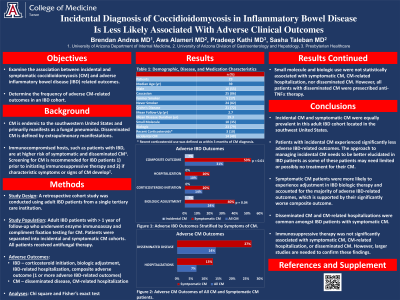Monday Poster Session
Category: IBD
P2220 - Incidental Diagnosis of Coccidioidomycosis in Inflammatory Bowel Disease Is Less Likely Associated With Adverse Clinic Outcomes
Monday, October 23, 2023
10:30 AM - 4:15 PM PT
Location: Exhibit Hall

Has Audio

Brendan Andres, MD
University of Arizona College of Medicine
Tucson, AZ
Presenting Author(s)
Aws Alameri, MD1, Brendan Andres, MD2, Pradeep Kathi, MD3, Sasha Taleban, MD2
1University of Arizona-Tucson College of Medicine, Tucson, AZ; 2University of Arizona College of Medicine, Tucson, AZ; 3Presbyterian Health care, Albuquerque, NM
Introduction: Coccidioides fungi, found primarily in the southwestern United States, can cause coccidioidomycosis or Valley fever (VF). VF primarily infects the lungs but can lead to disseminated disease, particularly in immunocompromised hosts. 10% of inflammatory bowel disease (IBD) patients are exposed to coccidioides in endemic areas and those patients should undergo screening prior to initiating biologics. Moreover, IBD and VF-related outcomes in patients exposed to coccidioides are poorly defined. We aimed to evaluate IBD and VF-related outcomes in IBD patients with coccidioides exposure.
Methods: We conducted a retrospective cohort study at a single, tertiary care center. Inclusion criteria included IBD patients ≥18 years old, diagnosis of VF by enzyme immunoassay and immunodiffusion or on tissue biopsy, and ≥1 year of follow-up. Patients with human immunodeficiency virus, active malignancy, current chemotherapy, or radiation were excluded. We examined IBD-related outcomes including need for biologic adjustment, corticosteroid initiation, and IBD-related hospitalizations. We evaluated VF-related outcomes including disseminated disease, symptomatic disease, and hospitalization. Chi square was used for analysis.
Results: Evidence of acute or chronic infection was present in 29 patients (table 1). Nine (31.0%) unique patients had at least one adverse IBD-related outcome; four (13.7%) required corticosteroids, three (10.3%) had an IBD-related hospitalization, and seven (24.1%) required biologic adjustment due to an IBD flare. There were six VF-related outcomes in five patients; four (13.8%) had disseminated disease and two (6.9%) required hospitalization. All four patients with disseminated VF were on anti-TNF therapy at the time of infection. Overall, 14 (48.3%) of patients had at least one adverse IBD or VF-related outcome. Of the 29 patients, 15 (51.7%) had symptomatic VF, and 12 of the 14 patients with adverse outcomes had symptomatic coccidioides at diagnosis. Besides, when comparing symptomatic and asymptomatic VF patients, biologic use did not increase the likelihood of symptomatic infection or hospitalization.
Discussion: Nearly half of VF infections in IBD are incidentally diagnosed. Overall, 30% of IBD patients with coccidioides exposure have an adverse IBD outcome. A vast majority of adverse clinical outcomes occur in IBD patients with symptomatic VF, and a quarter of these symptomatic patients develop disseminated VF. Further studies are needed to confirm these findings.
Disclosures:
Aws Alameri, MD1, Brendan Andres, MD2, Pradeep Kathi, MD3, Sasha Taleban, MD2. P2220 - Incidental Diagnosis of Coccidioidomycosis in Inflammatory Bowel Disease Is Less Likely Associated With Adverse Clinic Outcomes, ACG 2023 Annual Scientific Meeting Abstracts. Vancouver, BC, Canada: American College of Gastroenterology.
1University of Arizona-Tucson College of Medicine, Tucson, AZ; 2University of Arizona College of Medicine, Tucson, AZ; 3Presbyterian Health care, Albuquerque, NM
Introduction: Coccidioides fungi, found primarily in the southwestern United States, can cause coccidioidomycosis or Valley fever (VF). VF primarily infects the lungs but can lead to disseminated disease, particularly in immunocompromised hosts. 10% of inflammatory bowel disease (IBD) patients are exposed to coccidioides in endemic areas and those patients should undergo screening prior to initiating biologics. Moreover, IBD and VF-related outcomes in patients exposed to coccidioides are poorly defined. We aimed to evaluate IBD and VF-related outcomes in IBD patients with coccidioides exposure.
Methods: We conducted a retrospective cohort study at a single, tertiary care center. Inclusion criteria included IBD patients ≥18 years old, diagnosis of VF by enzyme immunoassay and immunodiffusion or on tissue biopsy, and ≥1 year of follow-up. Patients with human immunodeficiency virus, active malignancy, current chemotherapy, or radiation were excluded. We examined IBD-related outcomes including need for biologic adjustment, corticosteroid initiation, and IBD-related hospitalizations. We evaluated VF-related outcomes including disseminated disease, symptomatic disease, and hospitalization. Chi square was used for analysis.
Results: Evidence of acute or chronic infection was present in 29 patients (table 1). Nine (31.0%) unique patients had at least one adverse IBD-related outcome; four (13.7%) required corticosteroids, three (10.3%) had an IBD-related hospitalization, and seven (24.1%) required biologic adjustment due to an IBD flare. There were six VF-related outcomes in five patients; four (13.8%) had disseminated disease and two (6.9%) required hospitalization. All four patients with disseminated VF were on anti-TNF therapy at the time of infection. Overall, 14 (48.3%) of patients had at least one adverse IBD or VF-related outcome. Of the 29 patients, 15 (51.7%) had symptomatic VF, and 12 of the 14 patients with adverse outcomes had symptomatic coccidioides at diagnosis. Besides, when comparing symptomatic and asymptomatic VF patients, biologic use did not increase the likelihood of symptomatic infection or hospitalization.
Discussion: Nearly half of VF infections in IBD are incidentally diagnosed. Overall, 30% of IBD patients with coccidioides exposure have an adverse IBD outcome. A vast majority of adverse clinical outcomes occur in IBD patients with symptomatic VF, and a quarter of these symptomatic patients develop disseminated VF. Further studies are needed to confirm these findings.
Disclosures:
Aws Alameri indicated no relevant financial relationships.
Brendan Andres indicated no relevant financial relationships.
Pradeep Kathi indicated no relevant financial relationships.
Sasha Taleban indicated no relevant financial relationships.
Aws Alameri, MD1, Brendan Andres, MD2, Pradeep Kathi, MD3, Sasha Taleban, MD2. P2220 - Incidental Diagnosis of Coccidioidomycosis in Inflammatory Bowel Disease Is Less Likely Associated With Adverse Clinic Outcomes, ACG 2023 Annual Scientific Meeting Abstracts. Vancouver, BC, Canada: American College of Gastroenterology.

